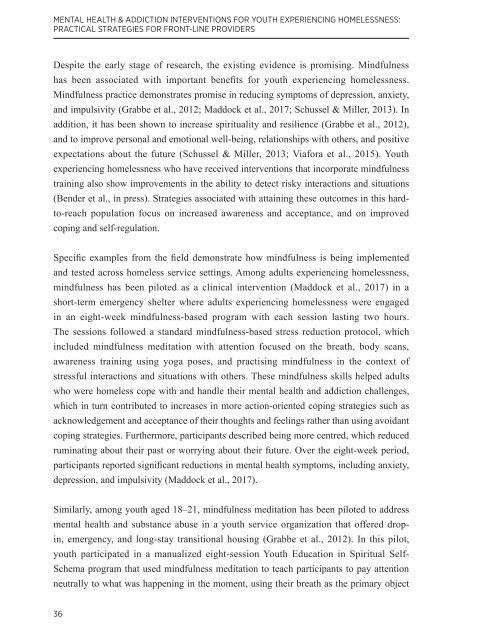COH-MentalHealthBook
You also want an ePaper? Increase the reach of your titles
YUMPU automatically turns print PDFs into web optimized ePapers that Google loves.
MENTAL HEALTH & ADDICTION INTERVENTIONS FOR YOUTH EXPERIENCING HOMELESSNESS:<br />
PRACTICAL STRATEGIES FOR FRONT-LINE PROVIDERS<br />
Despite the early stage of research, the existing evidence is promising. Mindfulness<br />
has been associated with important benefits for youth experiencing homelessness.<br />
Mindfulness practice demonstrates promise in reducing symptoms of depression, anxiety,<br />
and impulsivity (Grabbe et al., 2012; Maddock et al., 2017; Schussel & Miller, 2013). In<br />
addition, it has been shown to increase spirituality and resilience (Grabbe et al., 2012),<br />
and to improve personal and emotional well-being, relationships with others, and positive<br />
expectations about the future (Schussel & Miller, 2013; Viafora et al., 2015). Youth<br />
experiencing homelessness who have received interventions that incorporate mindfulness<br />
training also show improvements in the ability to detect risky interactions and situations<br />
(Bender et al., in press). Strategies associated with attaining these outcomes in this hardto-reach<br />
population focus on increased awareness and acceptance, and on improved<br />
coping and self-regulation.<br />
Specific examples from the field demonstrate how mindfulness is being implemented<br />
and tested across homeless service settings. Among adults experiencing homelessness,<br />
mindfulness has been piloted as a clinical intervention (Maddock et al., 2017) in a<br />
short-term emergency shelter where adults experiencing homelessness were engaged<br />
in an eight-week mindfulness-based program with each session lasting two hours.<br />
The sessions followed a standard mindfulness-based stress reduction protocol, which<br />
included mindfulness meditation with attention focused on the breath, body scans,<br />
awareness training using yoga poses, and practising mindfulness in the context of<br />
stressful interactions and situations with others. These mindfulness skills helped adults<br />
who were homeless cope with and handle their mental health and addiction challenges,<br />
which in turn contributed to increases in more action-oriented coping strategies such as<br />
acknowledgement and acceptance of their thoughts and feelings rather than using avoidant<br />
coping strategies. Furthermore, participants described being more centred, which reduced<br />
ruminating about their past or worrying about their future. Over the eight-week period,<br />
participants reported significant reductions in mental health symptoms, including anxiety,<br />
depression, and impulsivity (Maddock et al., 2017).<br />
Similarly, among youth aged 18–21, mindfulness meditation has been piloted to address<br />
mental health and substance abuse in a youth service organization that offered dropin,<br />
emergency, and long-stay transitional housing (Grabbe et al., 2012). In this pilot,<br />
youth participated in a manualized eight-session Youth Education in Spiritual Self-<br />
Schema program that used mindfulness meditation to teach participants to pay attention<br />
neutrally to what was happening in the moment, using their breath as the primary object<br />
36
















